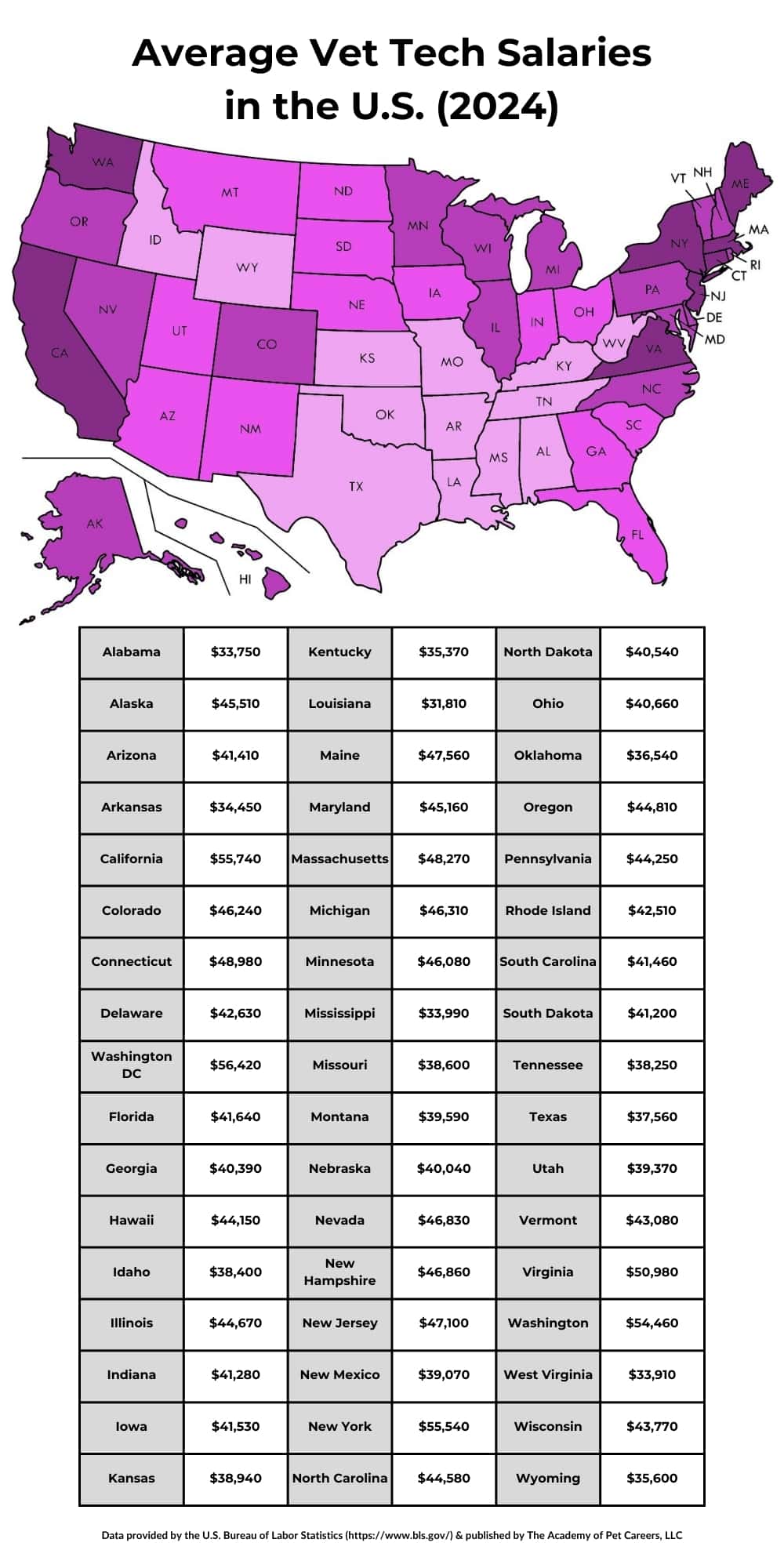Average Vet Tech Salary in 2024: How Much Do Vet Techs Make?

In the world of animal healthcare, veterinary technicians (vet techs) play a crucial role in ensuring the well-being of our furry companions. If you're considering a career in this field or are simply curious about vet tech salaries, you've come to the right place. Let's delve into the details of vet tech compensation, exploring average salaries, factors influencing pay rates, and what to expect in this rewarding profession.
Factors Affecting Vet Tech Salaries
- Level of Education and Training: Formal education, such as an associate's degree in veterinary technology, can lead to higher starting salaries.
- Geographic Location: Salaries can differ based on the cost of living and demand for vet tech services in different regions.
- Type of Employer: Work settings like private clinics, research facilities, and emergency hospitals may offer varying compensation packages.
- Years of Experience: Experienced vet techs typically earn higher salaries as they gain more expertise in the field.
- Specializations and Certifications: Obtaining specialized certifications like becoming a Licensed Veterinary Technician (LVT, RVT, CVT) can enhance earning potential.
Average Vet Tech Salaries
Veterinary technicians are skilled professionals who assist veterinarians in providing medical care to animals. As of recent data, the average annual salary for vet techs in the United States is approximately $44,000 per year (bls.gov). This figure can vary significantly based on the factors listed above.
Average Vet Tech Salary by State
When considering a career as a vet tech, it's important to factor in regional variations in salaries. For instance, states like California, Alaska, and Massachusetts tend to offer higher salaries for vet techs compared to other areas with lower costs of living.

How Much Do Vet Techs Make Per Hour?
The compensation for vet techs can also be broken down by hourly rates, which range from $14 to $25 per hour on average across the country. This hourly wage can increase with additional training, experience, and specialized skills.
Salary Based on Experience and Certification
- Entry-Level Vet Tech Salary: New graduates typically start at the lower end of the salary spectrum, around $30,000 to $35,000 annually.
- Mid-Career Vet Tech Salary: With several years of experience, vet techs can earn between $40,000 to $50,000 annually.
- Senior-Level Vet Tech Salary: Seasoned professionals with advanced certifications and extensive experience can command salaries upwards of $55,000 per year or more.
Additional Compensation and Benefits
Beyond base salaries, vet techs can enjoy additional perks such as:
- Overtime Pay: Many vet techs receive overtime compensation for working beyond regular hours.
- Bonuses: Some employers offer performance-based bonuses or incentives for exceptional work.
- Healthcare Benefits: Comprehensive healthcare coverage, including medical, dental, and vision insurance, is often provided.
- Retirement Plans: Vet techs may have access to retirement plans like 401(k) with employer contributions.
Job Outlook and Demand for Vet Techs
The demand for vet techs is projected to grow faster than average due to the increasing pet population and advancements in veterinary medicine. This positive job outlook means that vet techs can anticipate ample career opportunities and room for professional growth.
Challenges and Rewards of Being a Vet Tech
Working as a vet tech can be both emotionally fulfilling and demanding. The job requires compassion, patience, and a deep love for animals. While challenging, the opportunity to make a difference in the lives of pets and their owners can be incredibly rewarding.
Frequently Asked Questions
The average hourly wage for vet techs ranges from $14 to $25 per hour, depending on location, experience, and certifications.
Becoming a licensed veterinary technician (LVT) can significantly impact salary. Licensure often leads to increased earning potential, as many employers prefer or require this credential.
Yes, vet techs commonly receive benefits including healthcare coverage (medical, dental, vision) and retirement plans (such as 401(k) contributions) from their employers. This is more popular in corporate clinics.
The outlook for career growth in veterinary technology is promising, with opportunities for specialization in areas such as dentistry, anesthesia, and emergency care. Advancement into teaching, research, or management roles is also possible.
In conclusion, pursuing a career as a vet tech can be both financially and personally fulfilling. The salary range reflects the dedication and expertise required for this vital role in animal healthcare. Whether you're just starting your journey or looking to advance in the field, vet techs contribute immensely to the well-being of our beloved pets while enjoying a rewarding career path.
 Author - Joseph Schifano
Author - Joseph Schifano
Joseph Schifano is the owner and President of The Academy of Pet Careers. With over 20 years of experience working in the pet field, managing large scale pet care businesses, he has experience in every facet of the industry. Joseph's focus is primarily on the business of pet care but his passion is in understanding animal behavior how a dog's brain works so we can improve the care we provide as pet professionals. He is a huge advocate for Pet Empowerment and Force Free training methods. Read more in Joseph's full bio.
